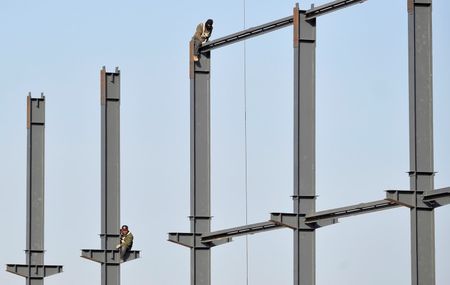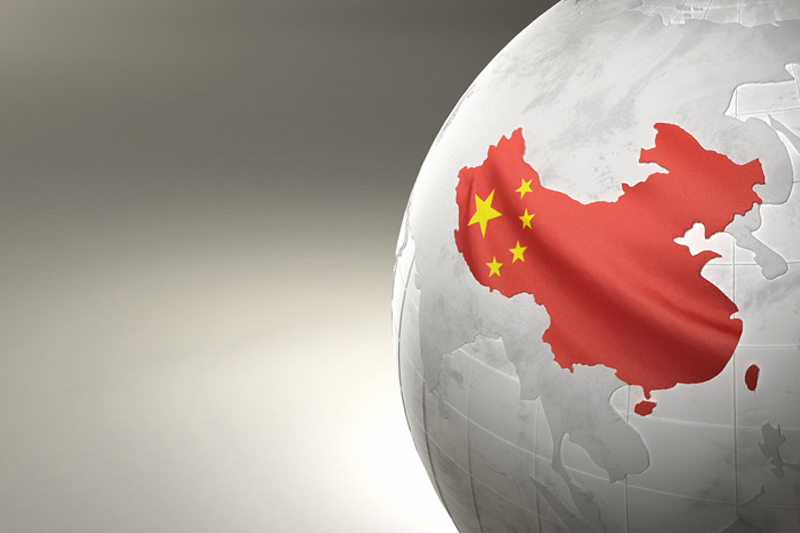By Fayen Wong
SHANGHAI (Reuters) - Subsidies accounted for four-fifths of the profits reported by Chinese steel companies in the first half of this year, a dramatic increase in reliance on state support that illustrates starkly the industrial weakness that is an increasing drag on the economy.
The headwinds faced by China's massive steel sector - falling profit margins and growing dependence on handouts - are shared by other key industrial and infrastructure-related sectors, including aluminium, cement and coal.
A Reuters analysis of first-half financial statements from 77 listed Chinese steel, aluminium and cement companies revealed a sharp deterioration in profitability.
For the first half of 2013, subsidies accounted for 22 percent of total profits posted by China's listed steel mills, and reached 47 percent in the full year. In the first six months of 2014, the figure jumped to 80 percent, and, even then, the sector's profit margin halved to just 0.3 percent.
The performance of the steel sector, which has been a major driver of China's growth, underlines the massive challenge facing President Xi Jinping as Beijing tries to wean the economy off its dependence on external demand and investment spending.
Data out at the start of the week showed China factory output grew at the weakest pace in nearly six years in August, raising fears that the economy may be at risk of a sharp slowdown unless Beijing implements fresh stimulus measures.
The company statements also show rising accounts receivable - the accounting term for money owed by customers - in a sign that more Chinese manufacturers are falling behind on their payments as growth falters, posing an additional problem for firms with high credit costs and financing difficulties.
STRUCTURAL REFORM
Chinese leaders have repeatedly said they would use a period of anticipated slower growth to implement structural reform. Growth was at its weakest in 18 months in the first quarter, but the level of support still being poured into companies suggests the re-tooling of the economy has a long way to go.
A total of 2,235 firms, or 88 percent of Chinese listed companies, received government subsidies totalling 32.2 billion yuan (3.18 billion pounds) in the first half of 2014, according to data from information provider ChinaScope.
Most of the subsidies - largely from local governments - were channelled to the steel, cement and property sector in the form of cash, tax rebates or support for loan repayments. The reasons given ranged from research and development to support for government environmental priorities.
"There isn't a lot of innovation happening in sectors such as steel or aluminium," said Professor Wen Laicheng at Central University of Finance and Economics in Beijing. "The subsidies are clearly a lifeline to help the companies get through these tough times."
Three decades of double-digit growth rates encouraged companies to invest and build factories at a breakneck pace - resulting in high levels of debt, chronically weak profits and worsening pollution.
Premier Li Keqiang has tried to rally local governments' support to tackle persistent overcapacity, but the continuing subsidies show how Beijing is fighting a losing battle.
SUBSIDY LIFELINE
China's central and provincial governments have long fed its state-owned and private firms with a steady dose of subsidies to boost growth, support jobs and create national champions.
Dependence on that support has risen sharply in the past six months as more industries, now struggling with overcapacity and anaemic growth, are beginning to buckle under heavy debts.
A fifth of China's 33 listed steel mills received subsidies accounting for more than half of their profits in the first half, with Chongqing Iron and Steel (SS:601005) getting the largest handout of 509 million yuan ($82.89 million).
Even with the aid, the firm still reported a loss of 945 million yuan as demand waned and steel prices tumbled.
Larger rival Valin Steel Co Ltd , which swung back into profit in the first half, received nearly 80 million yuan in subsidies - four times its earnings. Without the grant, it would have a loss of 61 million yuan.
Hefty government subsidies have helped companies such as Chongqing Iron and Steel, as well as Hunan Valin and others, post profits in previous years, without which they would have been delisted from the exchange. Chinese bourses delists companies after reporting three consecutive years of losses.
For the aluminium sector, government total subsidies received by 21 listed firms in the first half were 561 million yuan, accounting for 45 percent of profits.
Aluminium companies reported a combined net loss of 1.24 billion yuan in the first half, versus a net profit of 2.43 billion in the same period last year - when subsidies accounted for 42 percent of profits.
Profit margins for aluminium smelters have also dropped to below 1 percent, versus a one-year benchmark borrowing rate of 6 percent, while the sector's average debt-to-equity ratio has reached 154 percent, according to Thomson Reuters data.
Considered alongside reports this year of steel mills defaulting on bank loans, property developers going bust and coal miners mired in losses and owing wages, these numbers should serve as red flags to the potential fallout from China's mounting debt problems should the economy slow further.
Non-performing loans at Chinese banks have already jumped to a five-year high of 694.4 billion yuan in the first half, and worries of more defaults have already led them to cut off riskier borrowers and further tighten lending terms.
With local governments struggling with falling investment and many saddled with swollen debts arising from unprofitable grandiose projects, their ability to keep struggling industrial firms afloat in the longer term is also in question.
"These subsidies are only delaying the inevitable because no matter how much money the government dumps in, many of these companies cannot recover," said Liu Haiming, deputy director of China Steel Development and Reserch Institute.
"Local governments are also cash-strapped and cannot afford to keep pouring in money to save companies."

(Additional reporting by Shanghai Newsroom and David Stanway in BEIJING; Editing by Alex Richardson)
